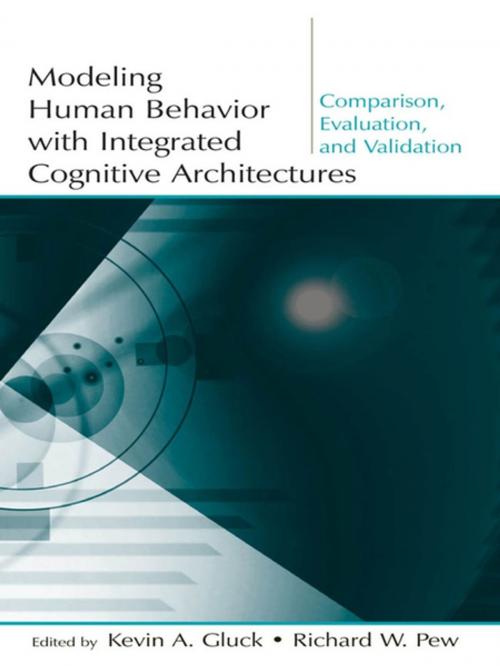Modeling Human Behavior With Integrated Cognitive Architectures
Comparison, Evaluation, and Validation
Nonfiction, Computers, Advanced Computing, Artificial Intelligence, Health & Well Being, Psychology, Applied Psychology, Cognitive Psychology| Author: | ISBN: | 9781135610487 | |
| Publisher: | Taylor and Francis | Publication: | April 21, 2006 |
| Imprint: | Psychology Press | Language: | English |
| Author: | |
| ISBN: | 9781135610487 |
| Publisher: | Taylor and Francis |
| Publication: | April 21, 2006 |
| Imprint: | Psychology Press |
| Language: | English |
Resulting from the need for greater realism in models of human and organizational behavior in military simulations, there has been increased interest in research on integrative models of human performance, both within the cognitive science community generally, and within the defense and aerospace industries in particular. This book documents accomplishments and lessons learned in a multi-year project to examine the ability of a range of integrated cognitive modeling architectures to explain and predict human behavior in a common task environment that requires multi-tasking and concept learning.
This unique project, called the Agent-Based Modeling and Behavior Representation (AMBR) Model Comparison, involved a series of human performance model evaluations in which the processes and performance levels of computational cognitive models were compared to each other and to human operators performing the identical tasks. In addition to quantitative data comparing the performance of the models and real human performance, the book also presents a qualitatively oriented discussion of the practical and scientific considerations that arise in the course of attempting this kind of model development and validation effort.
The primary audiences for this book are people in academia, industry, and the military who are interested in explaining and predicting complex human behavior using computational cognitive modeling approaches. The book should be of particular interest to individuals in any sector working in Psychology, Cognitive Science, Artificial Intelligence, Industrial Engineering, System Engineering, Human Factors, Ergonomics and Operations Research. Any technically or scientifically oriented professional or student should find the material fully accessible without extensive mathematical background.
Resulting from the need for greater realism in models of human and organizational behavior in military simulations, there has been increased interest in research on integrative models of human performance, both within the cognitive science community generally, and within the defense and aerospace industries in particular. This book documents accomplishments and lessons learned in a multi-year project to examine the ability of a range of integrated cognitive modeling architectures to explain and predict human behavior in a common task environment that requires multi-tasking and concept learning.
This unique project, called the Agent-Based Modeling and Behavior Representation (AMBR) Model Comparison, involved a series of human performance model evaluations in which the processes and performance levels of computational cognitive models were compared to each other and to human operators performing the identical tasks. In addition to quantitative data comparing the performance of the models and real human performance, the book also presents a qualitatively oriented discussion of the practical and scientific considerations that arise in the course of attempting this kind of model development and validation effort.
The primary audiences for this book are people in academia, industry, and the military who are interested in explaining and predicting complex human behavior using computational cognitive modeling approaches. The book should be of particular interest to individuals in any sector working in Psychology, Cognitive Science, Artificial Intelligence, Industrial Engineering, System Engineering, Human Factors, Ergonomics and Operations Research. Any technically or scientifically oriented professional or student should find the material fully accessible without extensive mathematical background.















